What You’re Like in a Loop, Based On Your Myers-Briggs® Personality Type
Have you ever heard the word “looping” thrown around and wondered what it meant? In the type community, looping is an instance where someone veers back and forth between the dominant and tertiary functions in their mental function stack.
Here’s a picture to help clarify. We’re using the INTJ as an example, but we’ll be discussing all 16 personality types in the article:
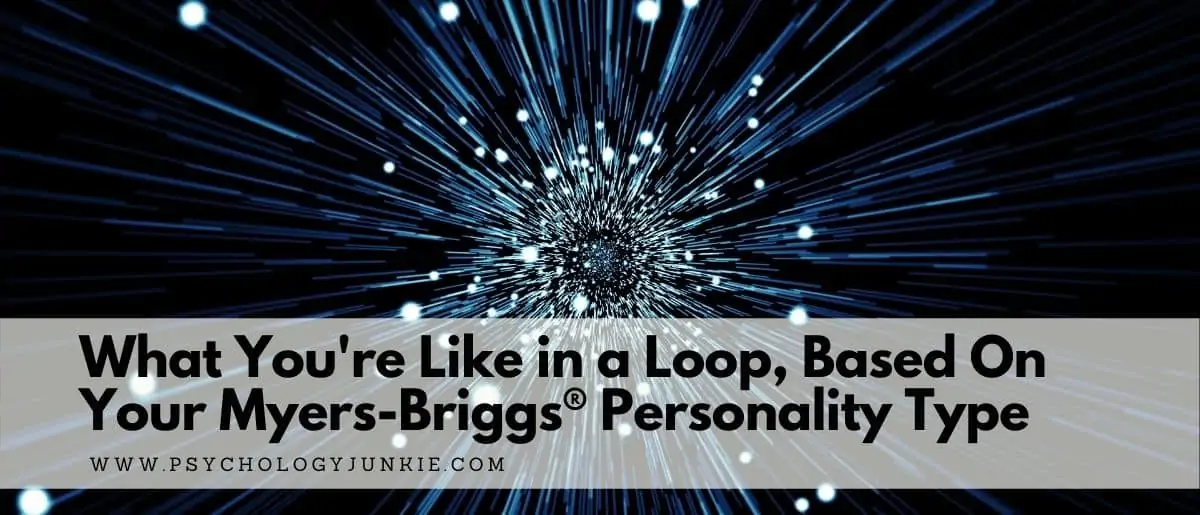
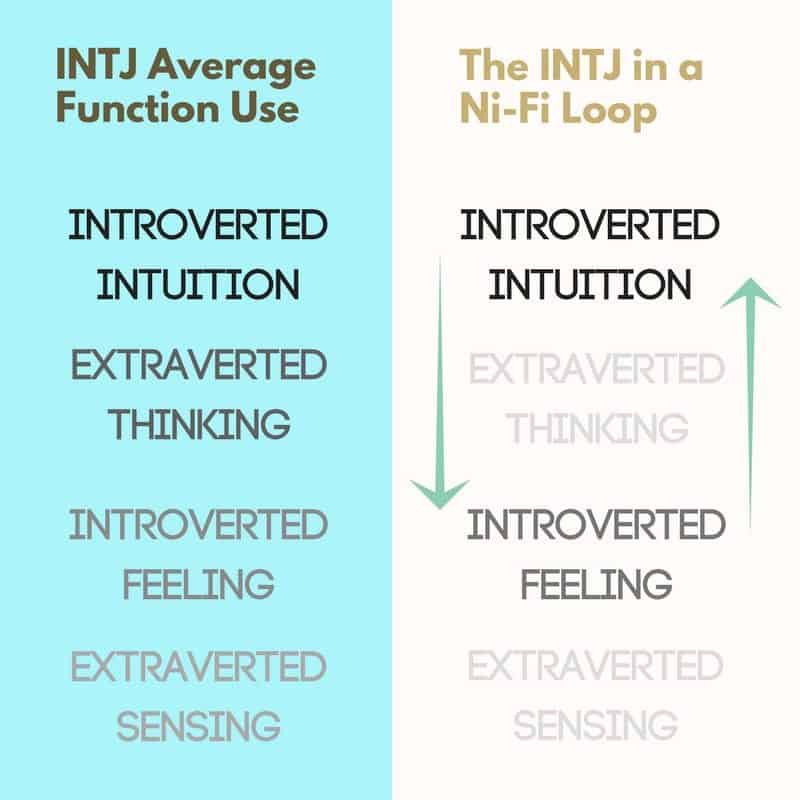
The INTJ functions best when there’s a healthy balance of introverted and extroverted input. But in a loop, the INTJ is more detached from the external world than is healthy. Instead of putting his insights and visions (N) into action (Te) he sits on them and analyzes them through the realm of his feeling function. How can this show up in a negative way? Well, that’s where this article comes in. We’re going to take a brief look at how “looping” shows up for each of the 16 Myers-Briggs personality types.
In the coming 7 days I will be finishing up a post with ways to combat a loop – so stay tuned for that! In the meantime, this article can help you to become aware of whether you are in the process of working your way through a loop.
Why Does Looping Happen?
Looping often boils down to someone living in their preferred introverted or extroverted state at the expense of their well-being. Introverts are going to have a natural comfort with their introverted functions. For example, if you’re an ISFJ then Introverted Sensing (Si) and Introverted Thinking (Ti) will be comfortable for you because they don’t cause you to venture into an extroverted place. In the same way, an ESTP is most comfortable in the extroverted world. Therefore, they might enjoy staying in an Extraverted Sensing (Se) and Extraverted Feeling (Fe) loop.
Auxiliary-Inferior loops can happen, but dominant-tertiary loops are much more common. So today those are the loops we’re going to be looking at.
Confused?
Even if you don’t know about cognitive functions or function stacks yet, this article can help you to identify if you’re in an unhealthy pattern of type development. You can enjoy the read even without knowing all the in-depth typology jargon, I promise!
Want to find out more?
Joel Mark-Witt and Antonia Dodge from Personality Hacker have written extensively about loops in their book, Personality Hacker: Harness the power of your personality type to transform your work, relationships, and life
This article contains affiliate links to books on Amazon. If you purchase one of these books, I get a small kickback that I can use to pay for hosting and other demands of this site. I only recommend books I love.
What Each of the 16 Personality Types is Like in a Loop
Table of contents
- Why Does Looping Happen?
- Confused?
- Want to find out more?
- What Each of the 16 Personality Types is Like in a Loop
- The ENFP Ne-Te Loop
- The ENTP Ne-Fe Loop
- The INFP Fi-Si Loop
- The INTP Ti-Si Loop
- The ENFJ Fe-Se Loop
- The ENTJ Te-Se Loop
- The INFJ Ni-Ti Loop
- The INTJ Ni-Fi Loop
- The ESFP Se-Te Loop
- The ESTP Se-Fe Loop
- The ISFP Fi-Ni Loop
- The ISTP Ti-Ni Loop
- The ESFJ Fe-Ne Loop
- The ESTJ Te-Ne Loop
- The ISFJ Si-Ti Loop
- The ISTJ Si-Fi Loop
Estimated reading time: 14 minutes
The ENFP Ne-Te Loop
ENFPs are often the “visionaries” of the type community. Open-minded and enthusiastic, the world of possibility and innovation draw them in. When ENFPs get in a loop, they chase after ideas and accomplishment without reviewing input from their feeling side. This means that they get stuck in idea-generation and action without checking into their values, feelings, and individual ethics first.
How this can show up:
- Chasing after ideas without checking in to make sure the ideas coincide with their values or ethics
- Chasing “success” through a series of superficial, short-lived goals
- Spending an inordinate amount of time on “busywork” only to regret it later because it doesn’t provide true meaning or fulfillment
- Over-reacting to perceived offenses without taking time to internally process what’s happening
- Doing what’s easy rather than what they feel is right
- Burying negative feelings by chasing after achievement
- Struggling to put themselves in other people’s shoes without projecting
- Trying to solve every problem with hard facts
- Comparing themselves to the successes of others
- Becoming impatient and negative when having to introspect or analyze their values
The solution? ENFPs need to get in touch with their introverted feeling side. They should take time to examine what’s really important to them on a personal level. They should listen to their emotions and try to understand what “warning signs” or red lights they might be trying to show them. Before jumping into a decision, they should examine whether the action they’re about to take aligns with their deeply-held values. Find out more about introverted feeling.
The ENTP Ne-Fe Loop
ENTPs, like ENFPs, are often the “visionaries” of the type community. They enjoy exploring ideas, thinking-outside-the-box, and generating alternatives. When ENTPs get in a loop, they chase after ideas but they’re also easily swayed by outside opinion. They get stuck in idea-generation and buzz from the people around them without accepting input from their thinking side.
How this can show up:
- Jumping from project to project and quitting when things get tedious
- Trolling other people for a “reaction”
- Putting other people’s needs ahead of the most logical course
- Using emotion to defend against criticism (cracking jokes, appealing to emotions)
- Distrusting their own logic
- Seeking praise rather than determining their own sense of self-worth
- Using people as “tools” for self-centered gains
- Struggling to admit when they’re wrong
The solution? ENTPs need to get in touch with their introverted thinking side. They should identify the logical path forward for their life and eradicate lifestyle choices that don’t align with their goals and principles. They should examine their behaviors by looking into their beliefs and choices and examining the roots of those choices. They should get comfortable sitting with boredom and working towards their personally important goals because it makes sense to do so even if it’s tedious. Find out more about introverted thinking here.
The INFP Fi-Si Loop
Authentic and imaginative, INFPs are the “dreamers” of the type community. These types strive to live a life that aligns with their deeply-held values and ideals. When INFPs get in a loop, they double-down on their values and their subjective experiences without taking time to tap into their intuition.
How this can show up:
- Getting stuck in their comfort zone and not challenging their own ideas
- Retreating from the outside world extensively
- Having tunnel-vision and losing the ability to imagine other perspectives
- Becoming hooked on creature comforts and habits that are fine short-term but negative if relied on at the expense of their job, relationships, or personal growth
- Shutting out new experiences
- Hiding their true nature from others
- Ruminating over negative past experiences (or idealizing them)
- Being unwilling to examine their values or beliefs against any objective criteria
- Becoming defensive and bitter when someone challenges their ideas
- Being excessively risk-averse
The solution? INFPs need to get in touch with their extraverted intuition in order to find their path out of a loop. Before making a judgment, they should analyze alternate perspectives and possibilities. They should go out into the world and spend time with people they love. They should try new things, whether that means reading a new book, going to a new restaurant, or taking an online class about a subject they’ve never studied before. Find out more about extraverted intuition here.
The INTP Ti-Si Loop
Analytical and explorative, INTPs enjoy intellectual discovery and innovation. These types strive to examine their thoughts carefully, assessing whether their thinking is true and clear of biases or murky logic. When INTPs get into a loop, they become reclusive and obsessed with their thinking at the expense of their intuition.
How this can show up:
- Retreating from the world and thus failing to ground their theories in real-world experiences
- Becoming anxious or hesitant to try new things.
- Extreme aversion to risk.
- Relying on bad habits or creature comforts at the expense of their relationships or responsibilities.
- Developing tunnel vision and having difficulty generating positive alternatives or possibilities.
- Becoming an “armchair expert” on many things without testing their validity in the real world
- Avoiding human connection, even when they desire it
The solution? INTPs need to get in touch with their extraverted intuition in order to find their path out of a loop. Before making a judgment, they should analyze alternate perspectives and possibilities. They should go out into the world and spend time with people they love. They should try new things, whether that means reading a new book, going to a new restaurant, or taking an online class about a subject they’ve never studied before. Find out more about extraverted intuition here.
The ENFJ Fe-Se Loop
Visionary and empathic, ENFJs enjoy guiding people towards their potential and encouraging them in their goals. These types strive to create a sense of harmony and camaraderie in the world through reaching out and including others. That said, when ENFJs get into a loop, they lose their visionary clarity and become more reactive and impulsive.
How this can show up:
- Inability to tolerate being alone
- Reacting to other people without taking the time to analyze their perspectives thoroughly
- Chasing after emotional “highs” and thrills without looking at the long-term implications
- Selectively choosing “facts” to support their judgments
- Jumping to conclusions
- Chasing superficial markers of success and obsessing over “image”
- Feeling restless and indecisive and making poor choices as a result
- Becoming self-indulgent at the expense of their health
- Being out of touch with their own feelings
- Developing an impatient “hurry-it-up” attitude towards people, particularly introverts
The solution? ENFJs need to get in touch with their introverted intuition. They should sit with judgments and look for underlying patterns and insights before moving forward or assuming their judgment is error-proof. They should take time to be alone, meditate, and let themselves reflect without pressure. Find out more about introverted intuition here.
The ENTJ Te-Se Loop
Determined and ambitious, ENTJs are known for their brilliant long-term strategies and visionary insights. These types strive to achieve far-reaching goals and live lives of intellectual discovery. That said, when ENTJs are in a Te-Se loop they become fixated on achievement and action at the expense of their powerful intuition.
How this can show up:
- Putting their objectives into action too quickly, without thinking them through or looking at the long-term implications of their decisions
- Becoming fixated on short-term successes and achievements at the expense of their long-term goals
- Being impatient and high-tempered
- Escaping difficult situations without looking at the underlying patterns for the problems
- Becoming image-focused and superior because they fear inadequacy
- Avoiding introspection because they fear they will not like what they see
- Acting out recklessly and indulgently when stressed
The solution? ENTJs need to get in touch with their introverted intuition. They should sit with judgments and look for underlying patterns and insights before moving forward or assuming their judgment is error-proof. They should take time to be alone, meditate, and let themselves reflect without pressure. Find out more about introverted intuition here.
The INFJ Ni-Ti Loop
Insightful and empathetic, INFJs are known for their ability to see many perspectives and forecast future possibilities. Typically these types excel at understanding other people’s positions and making them feel “seen.” However, when INFJs are in a Ni-Ti loop, they detach from the outside world and lose touch with their powerful feeling side.
How this can show up:
- Retreating from the outside world excessively
- Becoming detached and critical of other people’s perspectives without understanding their underlying feelings
- Reacting impatiently when people intrude on them or request their help
- Becoming cold and distant towards loved ones
- Nitpicking other people’s arguments and pointing out minor technicalities to dismiss them
- Becoming self-protective and withdrawn in order to protect from vulnerability
- Becoming detached from their own feelings
- Stubbornly insisting on one “right” way to do things
- Trusting intuition and theories without testing their ideas in the real world for validity
- Getting stuck in overthinking and only trusting their own logic
The solution? INFJs need to get in touch with their extraverted feeling side. They can do this by reaching out to others and expressing their feelings or listening to other people express their feelings. They can practice random acts of kindness or help out or volunteer for a cause they believe in. Find out more about extraverted feeling.
The INTJ Ni-Fi Loop
Strategic and insightful, INTJs are known for their ingenious ways of changing the course of history. Like Nikola Tesla, INTJs want to discover new ways of improving the world and organizing life for efficiency. However, when INTJs are in a loop they become out-of-touch with their powerful thinking side.
How this can show up:
- Retreating from the outside world excessively
- Developing theories but failing to test them in the outside world
- Becoming defensive and over-reactive towards any perceived personal slight
- Feeling that they are misunderstood misfits even though they refuse to invite other people into their lives
- Believing that they are morally superior to others
- Trusting poor insights because they’re not logically analyzing them
- Being irresponsible and careless in personal relationships
- Reacting harshly to any interruption or demand from others
- Feeling like they shouldn’t have to do anything they don’t feel like doing
The solution? INTJs need to get in touch with their extraverted thinking side in order to get out of a loop. When they have an idea, they should evaluate their idea objectively, looking for contradictions or faulty logic. They should also organize their plans in a logical way and test them in the real world, setting measurable goals (like SMART goals) to see if they are effective ideas. Find out more about extraverted thinking here.
The ESFP Se-Te Loop
Realistic and fun-loving, ESFPs are often revered as the “champions” in the Myers-Briggs community. They aren’t afraid to take risks or act in the moment to fight for their loved ones or deeply-held values. However, when ESFPs are in a Se-Te loop they become out of touch with their introspective, profound feeling side.
How this can show up:
- Impulsively chasing excitement without checking into their moral compass
- Taking the easy path instead of the path that would provide long-term meaning
- Becoming stubborn and demanding
- Believing that their criticisms and judgments are objective, but not looking inward to analyze them properly
- Becoming forceful and aggressive to protect their ego
- Becoming obsessed with accomplishing a lot of “busy-work” tasks without slowing down to figure out which projects are the most important
- Losing touch with what matters to them personally
- Micro-managing others and believing that everyone else is “lazy” or too slow
- Basing their self-worth on external achievements
The solution? ESFPs need to get in touch with their introverted feeling side. They should take time to examine what’s really important to them on a personal level. They should listen to their emotions and try to understand what “warning signs” or red lights they might be trying to show them. Before jumping into a decision, they should examine whether the action they’re about to take aligns with their deeply-held values.
The ESTP Se-Fe Loop
Action-oriented and pragmatic, ESTPs are often called the “daredevils” of the type community. They use their kinesthetic intelligence and clever wit to solve crises’ that come their way. That said, when ESTPs are in a Se-Fe loop, they chase excitement and approval at the expense of their crucial thinking side.
How this can show up:
- Recklessly chasing fun and excitement at the expense of the most logical path
- One-upping or exaggerating in order to appear more impressive
- Becoming obsessed with image and external perceptions of success
- Difficulty admitting that their poor judgments caused long-term problems
- Using humor or emotions to deflect criticism
- Manipulating situations so that they deflect responsibility away from themselves
- Reacting impulsively without reflecting
- Relying too much on close relationships to set the course for their lives
- Not analyzing their own thinking critically
- Feeling the need to be the center of attention
The solution? ESTPs need to get in touch with their introverted thinking side. They should identify the logical path forward for their life and eradicate lifestyle choices that don’t align with their goals and principles. They should examine their behaviors by looking into their beliefs and choices and examining the roots of those choices. They should get comfortable sitting with boredom and working towards their personally important goals because it makes sense to do so even if it’s tedious. Find out more about introverted thinking here.
The ISFP Fi-Ni Loop
Thoughtful and profoundly introspective, ISFPs want to bring their emotional worlds to life through creativity or hands-on service in the world. They are typically considerate, curious, and understanding. However, when ISFPs are in a Fi-Ni loop, they lose their powerful connection with the sensing side of their personality type.
How this can show up:
- Complaining about difficult situations, but failing to act to change them
- Becoming fatalistic and only imagining negative possibilities
- Being non-conformist against rules without reason or cause
- Becoming disengaged from the outside world
- Losing touch with their normally realistic, pragmatic outlook
- Retreating from the outside world excessively
- Bending facts to fit a pattern, even if it doesn’t make sense
- Developing feelings of anxiety about their ability to cope with the future
- Becoming paranoid and frightened of the future
The solution? ISFPs need to get in touch with their extraverted sensing side. Getting out in the world, testing their ideas, getting active, and exploring new opportunities helps this side of their personality to thrive. Getting into extraverted sensing can involve spending time in nature, showing their creative work to others and accepting criticism, taking a healthy risk, or trying something new. Find out more about extraverted sensing here.
The ISTP Ti-Ni Loop
ISTPs are renowned for their practical outlook and rational, objective way of solving problems. Their pragmatic way of seeing the world imbues them with a calm way of dealing with make-or-break situations. That said, when ISTPs are in a Ti-Ni loop, they become detached from their powerful sensing perspective on life.
How this can show up:
- Retreating from the outside world excessively
- Having a fatalistic, gloomy perspective of the future
- Developing self-defeating attitudes as an excuse for not trying or persisting
- Becoming paranoid and reclusive
- Feeling like nobody can understand them
- Using scapegoats to blame their misfortune on
- Having a general lack of interest in new activities or opportunities
The solution? ISTPs need to get in touch with their extraverted sensing side. Getting out in the world, testing their ideas, getting active, and exploring new opportunities helps this side of their personality to thrive. Getting into extraverted sensing can involve spending time in nature, showing their creative work to others and accepting criticism, taking a healthy risk, or trying something new. Find out more about extraverted sensing here.
The ESFJ Fe-Ne Loop
Warm and engaging, ESFJs are often revered for their practical but conscientious demeanor. These types are concerned with the needs and feelings of others and will often go out of their way to help people in tangible ways. However, when ESFJs are in a Fe-Ne loop they lose touch with the grounded, sensing side of their personality type.
How this can show up:
- Jumping to conclusions too quickly
- Pursuing new experiences and pleasures to cover up their feelings of insecurity or discontentment
- Creating drama just to get a buzz of excitement
- Projecting blame and discomfort onto others
- Manipulating information to justify their conclusions
- Pursuing indulgent, risk-taking behavior
- Developing a plethora of random, shallow relationships
- Repeating the same mistakes over and over again without learning from them
The solution? ESFJs need to get in touch with their introverted sensing side. This means getting comfortable with stillness and reflection. It means looking at the history and facts of a situation before moving forward or forming a conclusive judgment. It also means analyzing the risk or safety of an opportunity before embarking on it. Find out more about introverted sensation here.
The ESTJ Te-Ne Loop
Decisive and organized, ESTJs focus on achieving their goals in the most efficient way possible. On top of that, their realistic, matter-of-fact demeanor helps them to take care of daily, routine details effectively. However, when ESTJs are in a loop they become out-of-touch with the powerful sensing side of their personality type.
How this can show up:
- Jumping to conclusions and refusing to back down
- Throwing caution to the wind and taking poorly thought-out risks
- Becoming hypocritical and making excuses to distract from mistakes
- Casting blame at others, projecting their own irresponsibility outwardly
- Manipulating data to blame others for their own negative feelings
- Forming premature judgments
- Being unable to learn from past mistakes
- Becoming overly-suspicious about other people’s motivations or intents
- Becoming ungrounded and less practical than usual
The solution? ESFJs need to get in touch with their introverted sensing side. This means getting comfortable with stillness and reflection. It means looking at the history and facts of a situation before moving forward or forming a conclusive judgment. It also means analyzing the risk or safety of an opportunity before embarking on it. Find out more about introverted sensation here.
The ISFJ Si-Ti Loop
Gentle, friendly, and responsible, ISFJs are renowned for their steadiness and commitment. Highly aware of details and routines, they strive to create stability and harmony in their outer world. However, when ISFJs are in a Si-Ti loop, they become distant and reserved, disconnected from their warm feeling side.
How this can show up:
- Retreating excessively from the outside world
- Behaving with less empathy and consideration than usual
- Becoming critical and cold in reaction to the perceived logical shortcomings of others
- Becoming out of touch with their own feelings and values
- Struggling to explain life choices or thoughts with clarity
- “Showing off” intelligence in order to prove their worthiness
- Nitpicking technicalities of things that others say; becoming pedantic
- Overthinking without taking action
- Perfectionistic behavior
- Becoming self-protective and overly-defensive
The solution? ISFJs need to get in touch with their extraverted feeling side. They can do this by reaching out to others and expressing their feelings or listening to other people express their feelings. They can practice random acts of kindness or help out or volunteer for a cause they believe in. Find out more about extraverted feeling.
The ISTJ Si-Fi Loop
Practical and serious, ISTJs decide logically how to organize their lives in the most effective way. They work steadily towards their goals, even when distractions try to dismantle their focus. Quiet and organized, many people depend on them for their loyal and steadfast nature. That said, when ISTJs are in a Si-Fi loop they become less logical and dependable because they’ve lost the connection with their powerful thinking side.
How this can show up:
- Retreating excessively from the outside world
- Having difficulty explaining their perspectives and plans in a logical way
- Forming warped judgments about others without confronting them directly to find out the truth
- Avoiding responsibilities; they won’t do things unless they feel like it
- Forming rigid judgments and perspectives without a willingness to see other perspectives
- Becoming quickly frustrated by challenges
- Believing that they are morally superior and their morals shouldn’t be questioned
- Using moral justifications to “cover up” their wrongdoings
The solution? ISTJs need to get in touch with their extraverted thinking side in order to get out of a loop. When they have an idea, they should evaluate their idea objectively, looking for contradictions or faulty logic. They should also organize their plans in a logical way and test them in the real world, setting measurable goals (like SMART goals) to see if they are effective ideas. Find out more about extraverted thinking here.
What Are Your Thoughts?
Do you have any suggestions or insights from your own experiences? Let us know in the comments!
Find out more about your personality type in our eBooks, Discovering You: Unlocking the Power of Personality Type, The INFJ – Understanding the Mystic, The INFP – Understanding the Dreamer, and The INTJ – Understanding the Strategist. You can also connect with me via Facebook, Instagram, or Twitter!

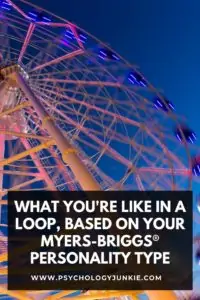






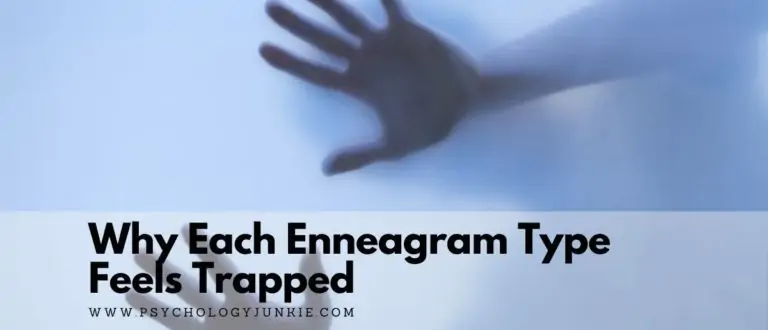
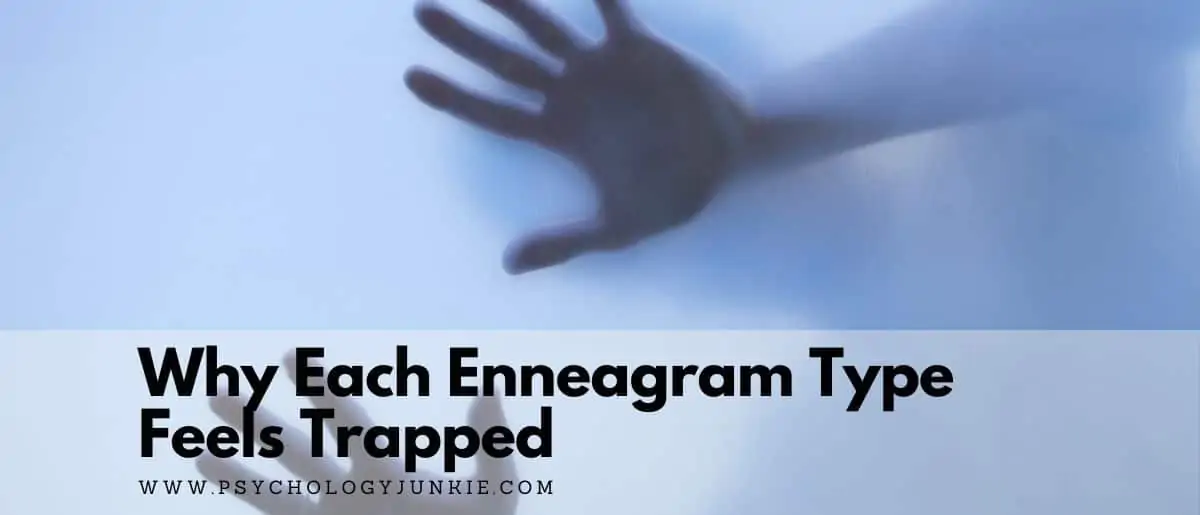




Great article, thanks for sharing! I’ve always found loops very interesting, as they can be so easy to fall into and they suppress a major part of our personalities. I’ve never heard of an auxiliary-inferior loop, but I’ve always wondered if there was such a thing. Does it work similarly to a person’s extraverted or introverted countertype’s dominant-tertiary loop? For example, an ESTJ’s auxiliary-inferior loop would be like an ISTJ’s dominant-tertiary loop?
As an INFJ, I can’t say that I agree with your summary here. Eventually my goal is always to go back to connecting with the outer world. However, many times we end up shutting down and entering this loop because we’re overwhelmed by the demand for our empathy. In my personal experience, it’s been easier to step out of the loop if I first focus on my Se which allows me to enjoy the external world without being needed. After I gain back some of my energy and feel more comfortable in the world I’m able to once again connect with others. Again, this is just a personal analysis of the advice given and I know it’s difficult to pinpoint exacts for each type.
Well, politely disagreeing with another comment here, loops don’t happen to all types exactly. It is just an example of an unhealthy version of a type, and if you don’t experience this much, then perhaps you’re just either more of an average type, or if you experience it very rarely, then you’re a healthier type. Reminder here that types are not explicitly healthy or unhealthy. It just depends on the individual. Though for some healthy types, if you remind yourself of your younger less experienced years, you might end up finding examples of that in your own life.
Hmm, well, I’ve never heard that auxiliary-inferior loops before, but I’ve theorized the concept for a long time already by watching people over time. It often seems to be the case either when introverts are pressured to act like extroverts all the time, or the extroverts shut down from intense depression to become isolated, both perhaps from not being accepted to be themselves. While introverts are more likely to be pressured to be extroverts, extroverts tend to experience greater struggles when rejected by peers, due to factors such as socioeconomic status, race, gender, sexuality or even small things like your fashion sense, your hobbies, or your taste in music.
Still, it seems worse in introverts after all. People just don’t seem to value introversion’s strengths, and just see being quiet all the time as a flaw. It’s rather unfortunate.
Is it possible to accurately assess one’s type while in a loop? I’ve taken different versions of the test (across 3 websites) multiple times, and either the questions seem vague (i.e., there’s too much overlap between possible responses) or the description of the type that results doesn’t seem to fit me. I wonder if I’ve been in a loop for so long (most of my life?) that I don’t know what my “typical” responses or strengths are.
I can see the truths in some of the loop examples given. That said, I do not identify with my own. After thorough analysis over time and testing it out, my stress looping is definitely not this. I way more identify with auxillary-inferior looping, that ends up twisting the dominant perspective; I need to lean into my tertiary to get out of it. I would be curious to read more of your take on auxillary-inferior looping, but can’t seem to find it. Please advise.